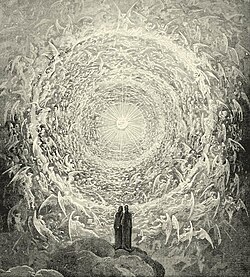Apeirophobia
| Apeirophobia | |
|---|---|
| Other names | Fear of infinity, fear of eternity, infinite fear, fear of endlessness, fear of the infinite, existential fear of infinity |
 | |
| Apeirophobia can arise from the fear of an eternal afterlife, such as Heaven in Christianity.[1] | |
| Specialty | Clinical psychology, psychiatry |
| Symptoms | Fear of infinity, fear of dying, panic attacks related to the event, or dreams relating to infinity, derealization, symptoms of existential OCD, disconnection from reality |
| Complications | Harm to self, social isolation, anxiety disorder, suicide |
| Usual onset | Adolescence or earlier |
| Duration | Long-term |
| Causes | Poorly understood |
| Treatment | Cognitive behavioral therapy, exposure therapy, desensitization therapy |
| Medication | Anti-anxiety medications |
Apeirophobia (from Ancient Greek: ᾰ̓́πειρος, romanized: ápeiros, lit. 'infinite, boundless') is a specific phobia, the excessive or irrational fear or phobia of infinity, eternity, endlessness, or the uncountable and is also known as fear of infinity, fear of eternity, infinite fear, fear of endlessness, fear of the infinite, or existential fear of infinity, causing discomfort and sometimes panic attacks from intrusive thoughts of the infinity.[2] It normally starts in adolescence or earlier and it is currently not known how it normally develops over time. Apeirophobia may be caused by existential dread about eternal life or oblivion following death. Due to this, it is often connected with thanatophobia (the phobia of death), chronophobia (the phobia of time or the passage of time), nihilophobia, and other existential fears.[1][3] Sufferers commonly report feelings of derealization which may cause the perception of a dreamlike or distorted reality. Existential OCD may sometimes be the cause of obsessive thoughts about infinity or eternity, which can lead to or trigger apeirophobia. Like other phobias, apeirophobia may be tied to mental health conditions such as anxiety disorders or obsessive-compulsive disorder.[3] Martin Wiener, a neuroscience professor at George Mason University, hypothesized that apeirophobia is a manifestation of the fear of an unknown future, similarly to the fear of aging.[4]
There is very little research on this phobia. Despite not being recognized specifically by the American Psychiatric Association in the DSM-5, it does meet their criteria for a specific phobia, which is a type of anxiety disorder.[1] There are no known treatment methods that are specifically designed to treat apeirophobia,[5] although some apeirophobes have benefited from anti-anxiety medications or cognitive behavioral therapy.[4]
See also
[edit]- Derealization
- Thanatophobia
- Chronophobia
- Anxiety disorder
- Obsessive–compulsive disorder
- Existential crisis
- List of phobias
References
[edit]- ^ a b c Azarian, Bobby (2016-09-01). "Apeirophobia: The Fear of Eternity". The Atlantic. Archived from the original on 2022-10-23. Retrieved 2020-11-13.
- ^ "Understand Apeirophobia: Fear of infinity". Exploring your mind. 2018-12-21. Archived from the original on 2020-11-13. Retrieved 2020-11-13.
- ^ a b "Apeirophobia – The Fear of Infinity". Practical Psychology. 2020-05-28. Retrieved 2023-12-07.
- ^ a b The Crippling Fear of Everlasting Life. The Atlantic. 2017-02-08. Retrieved 2025-02-05 – via YouTube.
- ^ "Apeirophobia (Fear of Infinity)". Psych Times. Archived from the original on 2022-12-10. Retrieved 2023-12-07.
